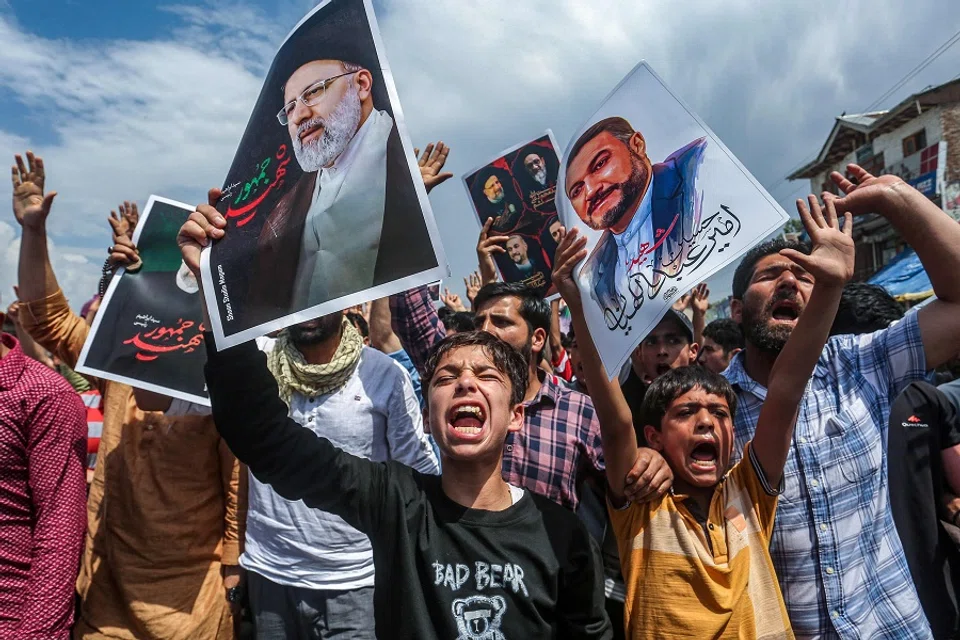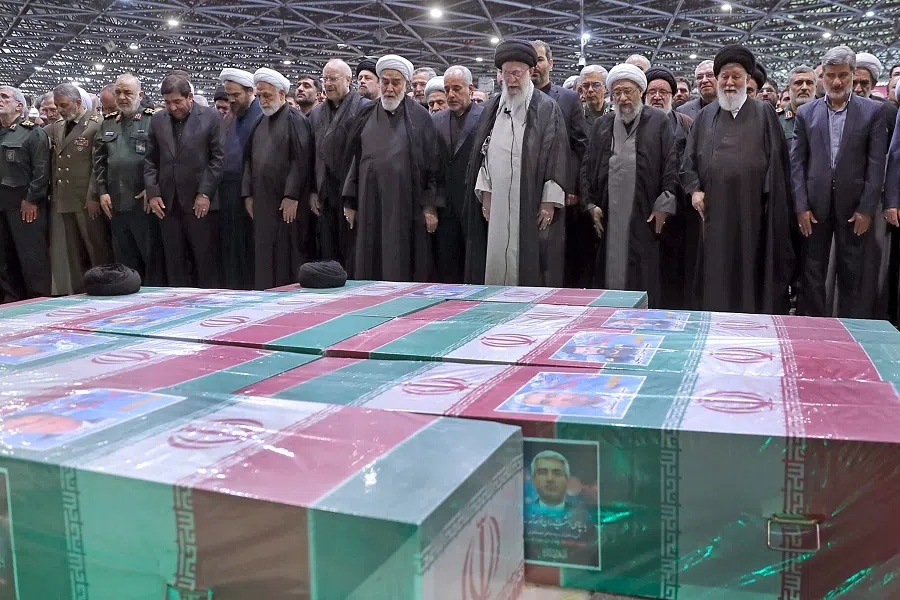China keeps eye on post-Raisi government amid Middle East turmoil
For now, the air crash leading to leadership changes in Iran is unlikely to impact China’s relationship with Iran, observes academic Alessandro Arduino. However, the situation could take a sudden turn, especially with Iran’s confrontation with Israel moving beyond the usual proxy war.

On 20 May, Chinese President Xi Jinping sent a message of condolence to Iran’s First Vice-President Mohammad Mokhber expressing deep sympathies to the family of the late President Ebrahim Raisi, the Iranian government and the people of Iran.
President Raisi and Iran’s Foreign Minister Hossein Amir-Abdollahian had been tragically killed in a helicopter crash on 19 May in a mountainous region of northern Iran, following a state visit to Azerbaijan. According to the Iranian constitution, in the event of the president’s death or incapacitation, the first vice-president assumes the role until a new election is held within 50 days.
Preliminary explanations suggest the crash may have been caused by a combination of an old aircraft, constrained maintenance due to international sanctions and severe weather conditions which also hampered the search and rescue efforts. Even so, the incident has sparked intense discussions on social media, particularly in the Middle East region which is prone to conspiracy theories.
Conspiracy theories and drone prowess
Among the various narratives surrounding the incident, one, in particular, is keeping both Iranian and Chinese security experts on edge: the dominance of Turkish drones. Ankara has deployed its top-of-the-line AkinciI unmanned aerial vehicle (UAV), equipped with thermal and night vision capabilities, to locate the crash site.
While Iranian drones have gained a reputation as affordable suicide drones (loitering munitions) in the Ukrainian conflict, their advanced capabilities — such as detecting heat sources in severe weather — are now under scrutiny. Meanwhile, Turkish combat drones are directly challenging China’s ambition to lead the armed UAV export market.
The unprecedented incident which cost the life of the Iranian president, could not have occurred at a worse time. Iran is still grappling with the aftermath of internal protests sparked by the death of Mahsa Amimi, a 22-year-old who died in police custody in 2022 for allegedly violating Iran’s Islamic dress code. Concurrently, tensions with Israel are escalating, as the conflict shifts from a proxy war to direct confrontation, including missile and drone attacks that moved the Middle East to the brink of a regional war.
Semblance of stability
Despite the significant blow to the political leadership, Iran’s supreme leader Ayatollah Ali Khamenei swiftly reassured both domestic and international audiences of the government’s stability, and Tehran’s internal security apparatus is on the lookout to quell any sign of protest that can contradict the supreme leader’s claims of stability. Almost certainly, political figures already favoured by the establishment are expected to secure victory, ensuring the preservation of the regime’s interests.
Iran has deepened its ties with China beyond business and trade, revising its Gulf region policies to align with China’s network of influence...

Beijing, being Iran’s leading economic partner and a crucial lifeline for Tehran’s heavily sanctioned economy, is unlikely to see any substantial changes in Iran’s foreign policy stance toward China in the short term. In March 2021, the two countries reached the pinnacle of diplomatic engagement, by establishing a comprehensive strategic partnership aimed at strengthening bilateral relations in energy, economy and security including the cybersecurity dimension.
While Iran’s pivot to the East began under President Mahmoud Ahmadinejad, Raisi sought to solidify Iran’s role as a key pillar of the Chinese Belt and Road Initiative in the region, with varying degrees of success. Both presidents acted under Supreme Leader Khamenei’s strategy for closer ties with China.
During his presidency, Raisi shifted Iran’s domestic and international politics in a more conservative direction, further establishing the country as a clear antagonist to the US in the region. At the same time, he maintained a stable, friendly relationship with Beijing and pursued an unprecedented rapprochement with Saudi Arabia, brokered by China.
In this respect, Iran has deepened its ties with China beyond business and trade, revising its Gulf region policies to align with China’s network of influence, aiming to secure a stronger position in a multilateral global order including the BRICS (Brazil, Russia, India, China, South Africa) bloc of top emerging economies and the Shanghai Cooperation Organisation (SCO).
Power play could change the status quo
However, the long-term impact of President Raisi’s death could be significant.
Raisi was one of the top candidates to succeed the 85-year-old supreme leader, alongside Ayatollah Khamenei’s son, Mojtaba Khamenei. Given that Mojtaba Khamenei has long been speculated as a contender for Iran’s top leadership position, it is no surprise that conspiracy theories are running rampant in Iran.
At the same time, it is important to remember that Raisi was elevated to the presidency due to his complete loyalty to Ayatollah Khamenei. Nevertheless, while transforming the role of the supreme leader into a hereditary position seems improbable, it cannot be entirely ruled out.
In the long run, conservative hardliners in the clerical and political elite internal struggle for the upcoming election will increase the challenges Iran already faces domestically and internationally.
The key question is how much the upcoming presidential election in late June will distract Iran during this fragile period, especially with the confrontation with Israel following the unprecedented missile and drone attack, moving beyond the usual proxy war.
In the long run, conservative hardliners in the clerical and political elite internal struggle for the upcoming election will increase the challenges Iran already faces domestically and internationally. For now, China’s relationship with Iran will remain strong.
Iran will stay its course, utilising all means available to show no signs of weakness despite rising tensions in the region. Yet, in the Middle East, Ernest Hemingway’s dictum from The Sun Also Rises holds true: crises often unfold in ‘’two ways: gradually, then suddenly.’’





